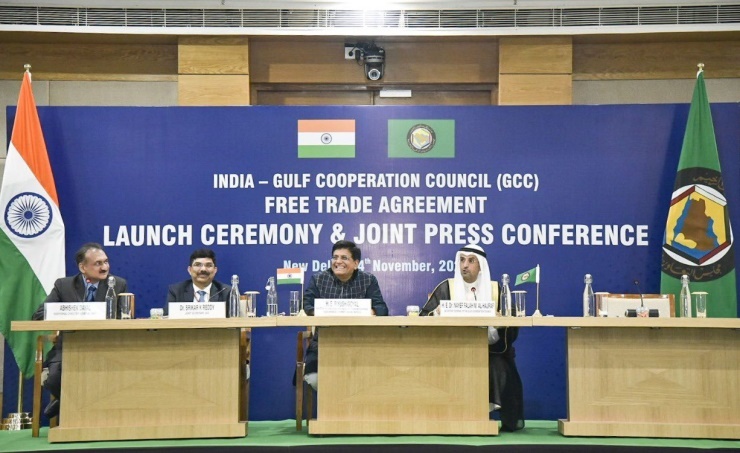New Delhi : India and the Gulf Cooperation Council (GCC) decided on Friday to pursue resumption of Free Trade Agreement (FTA) negotiations.
Indian Ministry of Commerce and Industry said in a statement that Indian Minister of Commerce and Industry Piyush Goyal and Secretary-General of GCC Nayef Falah M. Al-Hajraf held a joint press conference in New Delhi today to announce the intent to pursue negotiations on the IndiaGCC FTA, Kuwait News Agency (KUNA) reported.
During the bilateral engagement which was termed as forward-looking and solution-oriented, significant progress was made on all matters of mutual interest across the entire gamut of bilateral economic relations between the two sides.
“Both sides agreed to expedite conclusion of the requisite legal and technical requirements for formal resumption of the FTA negotiations.
The FTA is envisaged to be a modern, comprehensive agreement with substantial coverage of goods and services,” it added.
The proposed FTA will create new jobs, raise living standards, and provide wider social and economic opportunities, both sides emphasized.
They also “agreed to significantly expand and diversify the trade basket in line with the enormous potential that exists on account of the complementary business and economic ecosystems of India and the GCC.”
The GCC is considered largest trading partner bloc of India as bilateral trade in 2021-22 touched over USD 154 billion with exports valued at around USD 44 billion and imports of around USD 110 billion.
“Bilateral trade in services between India and the GCC was valued at around USD 14 billion in 2021-22, with exports valued at USD 5.5 Billion and imports at USD 8.3 billion,” the ministry stated. Around 35 percent of India’s oil imports and 70 percent of gas imports are from the GCC countries while GCC investments in India are currently valued at over USD 18 billion.
Earlier, Indian External Affairs Minister S Jaishankar had welcomed Al-Hajraf in India and noted the expanding India-GCC partnership. “Agreed to take it forward in newer areas, including in trade, security, culture and education. Also exchanged perspectives on regional and global developments and on building collective resilience,” Jaishankar said on his official Twitter account.


